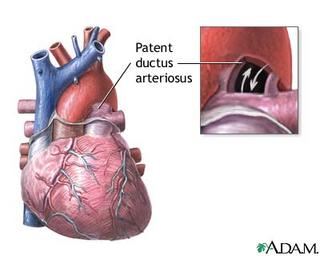
Definition:
Patent ductus arteriosus (PDA) is a condition where the ductus arteriosus, a blood vessel that allows blood to bypass the baby's lungs before birth, fails to close after birth. The word "patent" means open. Prior to birth, bloodflow in the fetus bypasses its lungs because the fetus gets oxygen through the placenta. After birth, the ductus arteriosus and foramen ovale close because blood must then go to the infant's lungs.
Alternative Names:
PDA
Causes, incidence, and risk factors:
PDA occurs in about 1 in 2,000 infants. Premature infants and those with respiratory distress syndrome are at higher risk. PDA is also associated with coarctation of the aorta, transposition of the great vessels, and ventricular septal defect.
No comments:
Post a Comment